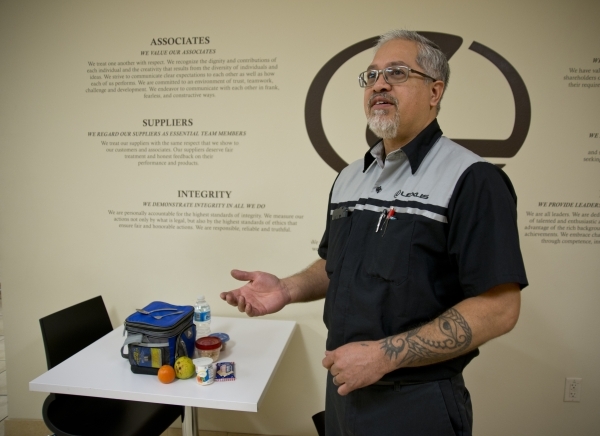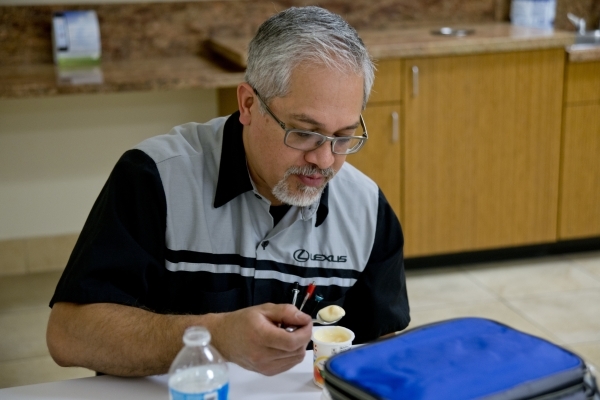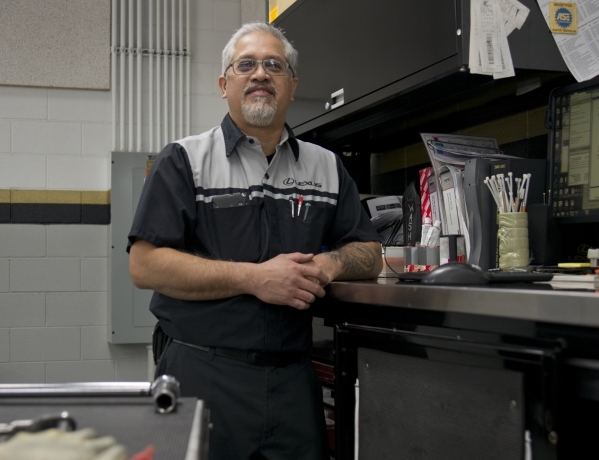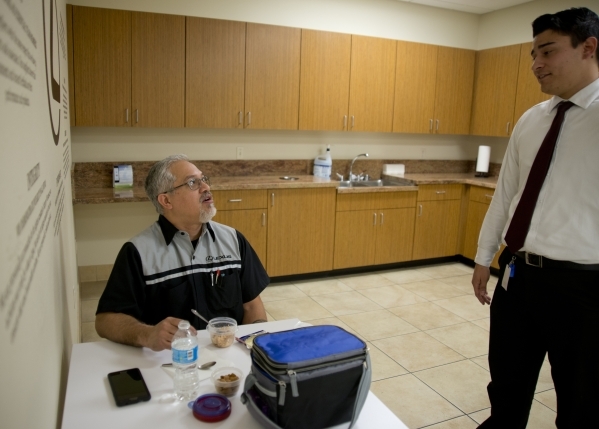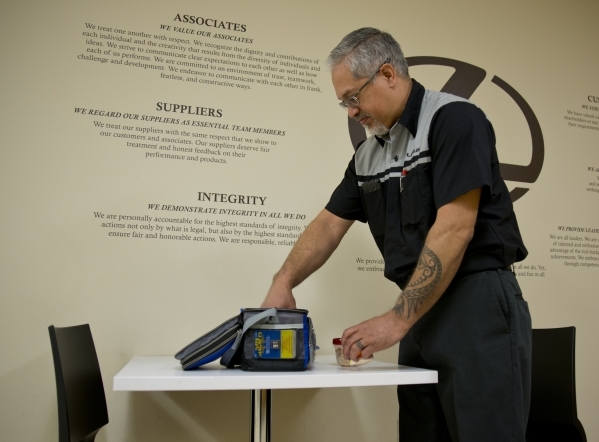Doctors out to convince you blood pressure important
If you have a toothache you go see a dentist. If you catch the flu, you seek medical care to relieve your symptoms. But if you have high blood pressure, unless it's very high, there aren't any symptoms. You don't know you are at risk for a stroke, heart attack or kidney disease.
That's why high blood pressure, aka hypertension, is called the "silent killer."
According to the Centers for Disease Control and Prevention, approximately 70 million American adults, one of every three adults, have high blood pressure, and only about half of these have their blood pressure under control. The CDC also points out that nearly one of three American adults have prehypertension.
In total, high blood pressure costs our nation $46 billion each year. These total expenses include the cost of health care services, missed days of work and high-blood pressure medication expenses.
Ken Kamae was 32 years old when he injured his elbow at work and was rushed to the hospital. When an ER physician took his vital signs he was asked if he felt dizzy. Kamae thought the question sounded a little unusual, smiled and said no. That's when he was told his blood pressure had spiked to 195/90 mm Hg.
This top number, systolic, measures the pressure in the arteries when the heart beats. The bottom number, diastolic, measures the pressure in the arteries between heartbeats. The medical community considers a normal reading to be a systolic less than 120 mm Hg and a diastolic less than 80 mm Hg. At risk, or prehypertension, is a systolic 120 to 139 mm Hg and a diastolic of 80 to 89 mm Hg. High blood pressure is measured at a systolic of 140 mm Hg or higher and a diastolic of 90 mm Hg or higher.
"I didn't think anything of it at first because I felt fine," Kamae remembered saying to himself at the hospital. "A couple weeks later when I went to see my regular doctor, it was still high. I thought about it then because my father had high blood pressure. I started taking HCTZ (hydrochlorothiazide) to lower my blood pressure."
With medication, Kamae said his blood pressure was brought down to 130/85 mm Hg. He followed this regimen for a couple of years until his HCTZ prescription ran out and then he stopped taking the drug.
"I remember one day I developed a nose bleed at work and it wouldn't stop for 20 to 30 minutes," Kamae said. "I was taken to urgent care and found out my blood pressure was up again at 198/103 mm Hg. It threw a shock into me because I realized that I could die because of this."
Since this last incident, Kamae has been very proactive in controlling his blood pressure. He takes two medications and has changed his eating habits. No more foods high in sodium (which raises blood pressure) such as chips, sodas, cookies, fast foods or processed meats. He brings his lunch to work and eats lean ham, yogurt and fruit such as apples and pears. He also takes vitamins every morning.
"If you just ignore high blood pressure it will get you," Kamae warned. "My father was diagnosed with high blood pressure and he had a couple of heart attacks. You are at risk for a stroke or a heart attack with high blood pressure."
Target BP
In an effort to make the general public more aware and health care professionals more attune to treating high blood pressure, the American Heart Association and American Stroke Association have teamed up to promote a new program called Target BP. Its goal is to support physicians and care teams in helping patients achieve blood pressure readings lower than 140/90 mm Hg.
Target BP is taking its cue from a recent study, the Systolic Blood Pressure Intervention Trial, or SPRINT, that found by lowering systolic blood pressure to 120 mm Hg participants in the study showed a reduced rate of heart attacks, acute coronary syndrome, heart failure and strokes. The study was sponsored by the National Institutes of Health and chronicled more than 9,300 people.
"With this newfound data, we realized we were doing a poor job of treating high blood pressure," said Dr. Willie Lawrence, a cardiologist at Research Medical Center in Kansas City, Mo., and the national spokesman for the American Heart Association. "Now we are encouraging physicians to get their patients' blood pressure under 140/90 mm Hg."
Target BP is attempting to spotlight the dangers of high blood pressure by pioneering a national registry where health care centers and individual health care professionals can register the names and vital information of patients with hypertension. In return, Target BP provides tools, such as algorithms, to create a road map for physicians to follow.
"We already have a commitment of 50 hospitals of 18 million patients," Lawrence said. "We want to hear from anyone who manages patients with high blood pressure and who need to be collectively followed."
Lawrence said health care centers are urged to sign up for Target BP by going to: www.heart.org/targetbp.
"One month's supply of blood-pressure medication is $4 or $5, which is the same price as a pack of cigarettes," Lawrence said. "Medications are important, but making changes in lifestyle are also important. We can help people learn how to do both."
Address prehypertension, too
Kate Grey, 52, discovered that making lifestyle changes in her diet greatly reduced her high blood pressure. She thought she was eating healthy by eating hummus, processed salads and low-calorie frozen foods. Unfortunately, she discovered that these foods contain high levels of sodium.
"In August (of last year) my physician said I had a high blood-pressure reading of 130/85 mm Hg," Grey remembered. "I told her I just drank three cups of coffee and said that was probably it. But in November when I had a sinus infection and went to a CVS Minute Clinic, my blood pressure was still high."
So when Grey made another appointment with her physician this past December and was diagnosed with prehypertension, she decided immediately to take control of her high blood pressure. She bought a hypertension monitor that works off an app she downloaded to her smart phone and religiously tracks her blood pressure in the morning and evening.
"I started to drink a 20-ounce bottle of water when I get up in the morning, and I try to eat an apple a day," Grey said. "I switched to making my own food to control my sodium. I increased my exercise by going to the gym twice a week. I was doing meditation on and off, and now I try to do it once a week. Time will tell if this all helps."
What Grey has noticed, though, is that her blood pressure was at its highest at 137/83 mm Hg before she made her lifestyle changes. After the changes it dropped on average to 120 mm Hg and at the lowest it was 104/74 mm Hg. It recently went up during the holidays when she succumbed, like many of us did, to some Yuletide treats.
Even though you maintain a healthy lifestyle and exercise, blood pressure does tend to go up with age. Dr. Robert Pretzlaff, chief medical officer of Dignity Health-St. Rose Dominican in Henderson, points out that arteries become less flexible with age and restrict blood flow and can cause hypertension. Also, there's a genetic component. African-Americans lead adults in having high blood pressure, followed by Mexican-Americans and then Caucasians.
While adult men tend to have high blood pressure more than women, the CDC reports that for women 65 years and older, their blood pressure tends to be higher than that of men. No one knows why this occurs in women, but some health professionals suspect it may be caused by hormonal changes.
"High blood pressure is a symptom of something and not the root," Pretzlaff said. "It's not about a one-time measurement, but if you consistently get high readings then you need to talk to your doctor. If you are seeing 160/105 mm Hg this means your blood pressure is abnormally high and you need to see someone."
Pretzlaff added that certain medications, such as steroids, increase blood pressure and both patients and their doctors need to monitor these medications.
Dr. Chowdhury Ahsan, a cardiologist at University Medical Center, said if your blood pressure is in the borderline zone (prehypertension) you need to monitor it throughout the day, usually in the morning and evening. He also recommended having your physician look at your target organs — the heart, brain, kidneys and changes in the eyes.
"We (health care providers) need to also talk to family members and emphasize to them that it's important that they help their loved ones get their high blood pressure under control," Ahsan said. "My advice to prescribers of medications is that they only prescribe one drug to be taken once a day so people will take their medication."
With Target BP, Ahsan said we now have the awareness and a goal. He emphasized that if health care professionals, patients and their families strive to meet these two objectives, compliance in treating high blood pressure will be achieved.
"We believe medications should not be done without lifestyle changes," Ahsan said. "Live healthy. Think healthy. And if you have a pre-existing family condition, seek help immediately."



